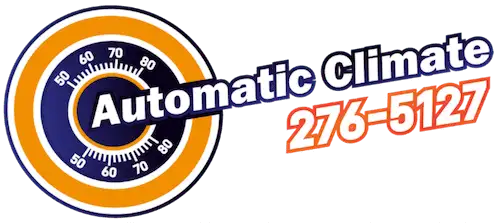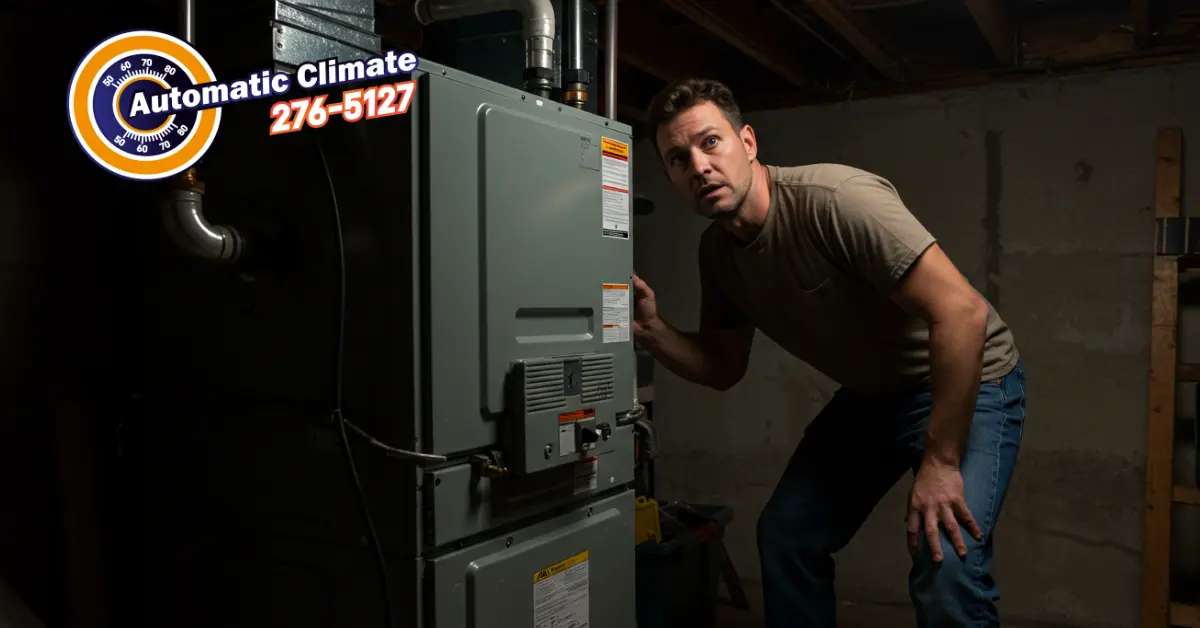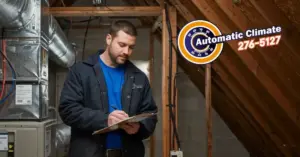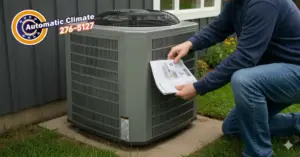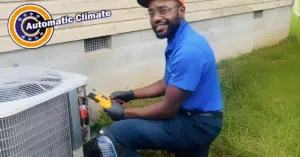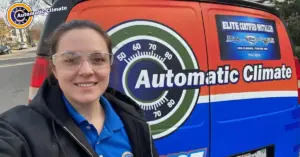Why is my HVAC system making strange or loud noises? Uncover the Mystery!
Is that sound normal? If you’re asking yourself “Why is my HVAC system making strange or loud noises?”, you’re not alone. That sudden bang, persistent rattle, or high-pitched whine can be more than just annoying – it can be a sign that your heating, ventilation, and air conditioning (HVAC) system needs attention. Here in Richmond, VA, where weather swings demand reliable heating and cooling, understanding these sounds is crucial. Ignoring an HVAC system making strange or loud noises could lead to bigger problems, reduced efficiency, and unexpected breakdowns.
Since 1983, Automatic Climate HVAC & Air Conditioning has been helping Richmond homeowners diagnose and resolve these very issues. We understand that peace and quiet (and comfort!) are paramount in your home. This article will guide you through the common culprits behind why your HVAC system making strange or loud noises, what those sounds might mean, and when it’s time to call in the professionals. Let’s decode those bumps, buzzes, and bangs together!
As Thomas Edison once said, “Opportunity is missed by most people because it is dressed in overalls and looks like work.” Sometimes, investigating that strange HVAC noise feels like work, but addressing it promptly is an opportunity to save money and hassle down the line.
Decoding the Cacophony: Common HVAC Sounds and What They Signal
Your HVAC system is a complex machine with many moving parts. It’s normal for it to make *some* noise – the gentle hum of the fan, the click of the thermostat, the whoosh of air through vents. But when new, loud, or unusual sounds emerge, it’s time to listen closely. An HVAC system making strange or loud noises is often its way of communicating a problem. Let’s break down some of the most frequent offenders:
1. Banging or Clanking: The Sound of Alarm
A loud bang, especially when the system starts up or shuts down, can be startling. This noise often points to a few potential issues:
- Ductwork Issues: Metal ducts expand and contract with temperature changes. If ducts are undersized or lack proper support, this expansion/contraction can cause a loud banging sound, often called “oil canning.” While sometimes harmless, persistent loud banging could indicate pressure issues.
- Loose Blower Parts: Inside your air handler or furnace, the blower fan is crucial. If a component like a connecting rod, piston pin, or even the blower wheel itself becomes loose or broken, it can bang against other parts during operation. This is a serious issue requiring immediate attention.
- Compressor Problems: The compressor, usually in your outdoor unit, can also be a source of banging if internal components fail or come loose. This often signals a significant problem with this vital component.
- Dirty Sock Syndrome (Less Common Noise, More Odor): While not typically a *loud* noise, sometimes dirty evaporator coils can lead to issues that might indirectly cause other components to work harder and potentially make noise. Keeping coils clean via services like an AC Clean & Check is important.
If you hear loud banging, it’s wise to turn off the system and call for heating repair or AC repair. Continuing to run a system with loose or broken internal parts can cause catastrophic damage. This is a prime example of why ignoring an HVAC system making strange or loud noises is risky.
Our Trusted Partners
EXCELLENTTrustindex verifies that the original source of the review is Google. Aaron J. Visited our home later this evening to follow up with today’s install and the system checked out as it should. The only issue we had was connecting and setting up the wireless thermostat due to the app issues. He was very professional and patient. John and Joe replaced our 2nd floor gas heating system in a professional manner. Everything went smooth according to them and they finished the job in less time than expected. Aaron was professional and extremely thorough during his visit to our home. He took the time to explain the workings of our HVAC system and answered every question. To add to the above, I called the office and spoke with both Austin and Jason who were also very helpful while explaining the warranty and transfer of same. We are extremely pleased with Automatic Climate and will highly recommend to anyone who may ask for recommendations.
Owner's reply
Thank you for sharing your positive experience! We're thrilled Aaron, Austin, and Jason could assist you so thoroughly. Your recommendation means a lot, and we're glad we could help with your HVAC system and warranty details.Posted onTrustindex verifies that the original source of the review is Google. I had a very positive experience with them. They had better financing options, better prices, and were more responsive than other companies I got quotes from. Michael Chris and the whole team were fantastic. Highly recommendPosted onTrustindex verifies that the original source of the review is Google. Technician was on time, personable and professional. He throughly explained everything that he was going to do and identified any concerns. Very pleased with the overall experience and would recommend to other homeownersPosted onTrustindex verifies that the original source of the review is Google. I had the coils cleaned in my tankless water heater. Aaron Jernigan was so seemingly competent, so well-mannered, so good explaining what was going on, I am considering switching to Automatic Climate, I will definitely have all the vents in my house blown out in the near future.Posted onTrustindex verifies that the original source of the review is Google. Fast, friendly, knowledgeable and professional. Their associate, Casey J, helped fix our heat when we were enduring 20-30 degree nights. Thank you so much!!Posted onTrustindex verifies that the original source of the review is Google. Charlie was very dedicated. Provided excellent service. Very impressed with his dedication. Did check on HVAC and cleaned drier vent in Condo we purchased last summer.Posted onTrustindex verifies that the original source of the review is Google. I've been a customer of Automatic Climate for several years. I value the services of this firm. My commitment to renewing my maintenance contract year after year is directly related to the technical expertise of one of the company’s many representatives, Antonio Diaz. Antonio has kept all three of my units running smoothly for years, and when necessary forewarns me early of any pending issues. He offers solutions right away without long waits for follow up. I've never had to call the company back to correct any of his work. Antonio attributes his success and extraordinary customer service to the culture of Automatic Climate. I would recommend Antonio and Automatic Climate to any of my friends and neighbors. They're a company you can trust.
Owner's reply
Thank you so much for your kind words! We're thrilled to hear you had a positive experience with our service.Posted onTrustindex verifies that the original source of the review is Google. John & Nick were here today to clean our air ducts. They were very thorough and made sure that they left our home as clean as when they arrived. They explained the process clearly and worked efficiently. Great job!Verified by TrustindexTrustindex verified badge is the Universal Symbol of Trust. Only the greatest companies can get the verified badge who has a review score above 4.5, based on customer reviews over the past 12 months. Read more
2. Rattling: Something’s Shaking Loose
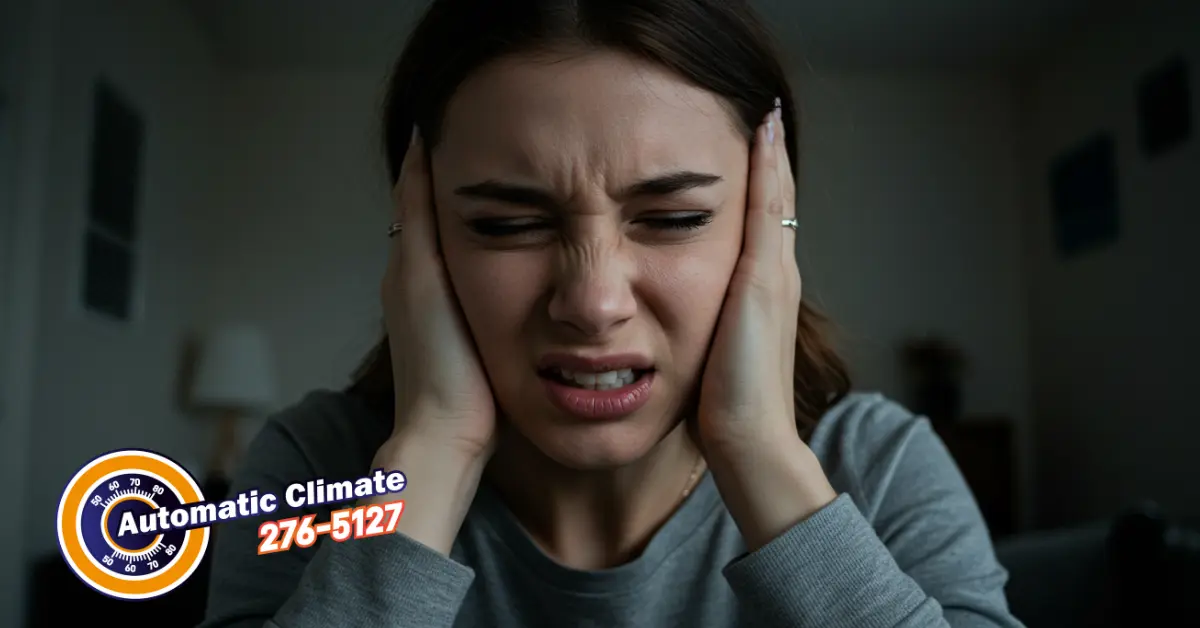
A rattling sound is usually less alarming than a bang, but still indicates something isn’t quite right. It often means something is loose or there’s debris where it shouldn’t be.
- Loose Panels or Screws: The access panels on your furnace, air handler, or outdoor unit can vibrate if screws become loose over time. This is often an easy fix – check and tighten accessible screws.
- Debris in the Outdoor Unit: Leaves, twigs, or other debris can get sucked into the outdoor condenser unit and rattle against the fan blades. Regularly clearing debris around your unit can prevent this.
- Loose Parts Inside: Similar to banging, internal components like fan blades or motor mounts can loosen and rattle.
- Ductwork Debris: Sometimes small objects can fall into vents or debris can accumulate in ducts, causing rattling when air flows through. Consider air duct cleaning if you suspect this.
- Aging System: As HVAC systems age, general wear and tear can lead to more vibrations and rattling. While not always critical, it can be a sign that components are nearing the end of their lifespan.
While you can check for loose panels or debris yourself, internal rattling often requires a professional diagnosis to pinpoint the exact cause of your HVAC system making strange or loud noises like rattling.
3. Buzzing: An Electrical Warning?
A buzzing sound often points towards an electrical issue within the HVAC system, which should always be taken seriously.
- Electrical Components: Issues with relays, contactors, circuit boards, or capacitors can cause buzzing sounds. Capacitors, in particular, are common culprits when they start to fail.
- Loose Wiring: Vibrations can sometimes loosen electrical connections, leading to buzzing or humming.
- Motor Problems: An aging or failing motor (either the blower motor indoors or the condenser fan motor outdoors) can buzz as it struggles.
- Refrigerant Leaks (Sometimes): While more often associated with hissing, certain types of refrigerant issues could potentially contribute to buzzing sounds in the compressor.
- Transformer Issues: The transformer that steps down voltage for the control circuits can buzz if it’s failing or loose.
Electrical problems are not DIY territory. If you suspect an electrical issue is causing your HVAC system making strange or loud noises (like buzzing), turn off the power at the breaker and call Automatic Climate immediately at (804) 803-1983.
4. Clicking: Normal or Not?
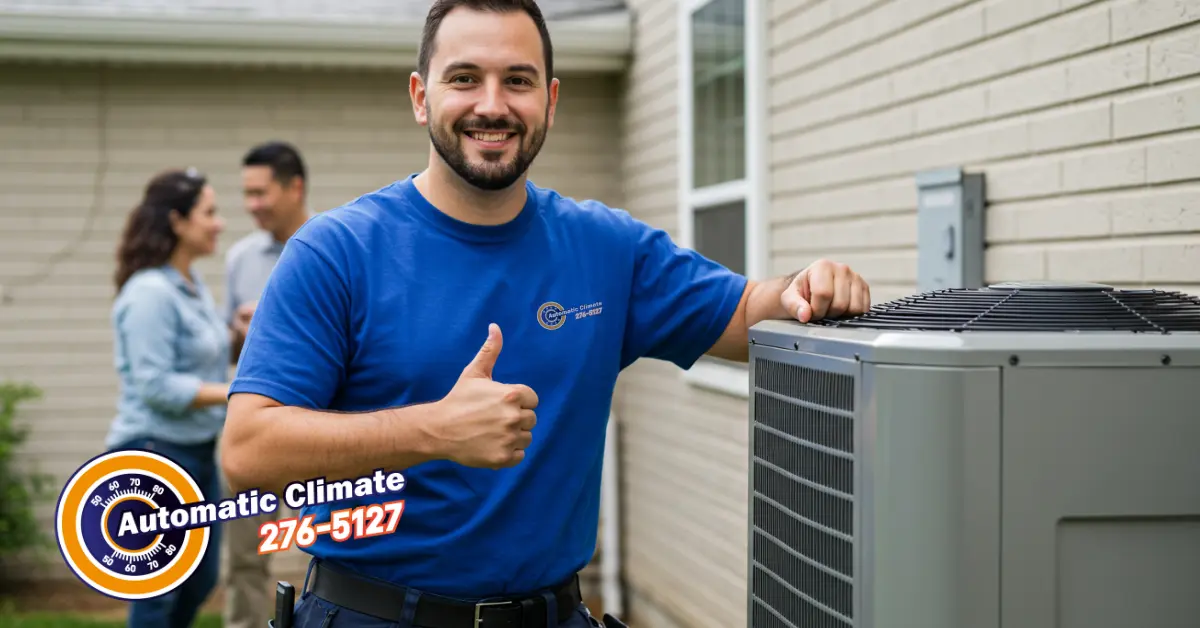
Clicking sounds can be perfectly normal, but persistent or unusual clicking warrants investigation.
- Normal Operation: Relays and controls often make clicking sounds when the thermostat signals the system to turn on or off. This is usually brief and expected.
- Ignition Issues (Furnace): On gas furnaces, the igniter might click repeatedly if it’s trying but failing to light the burners. This could be due to a dirty flame sensor, gas supply issues, or a faulty igniter.
- Failing Electrical Components: A failing capacitor, contactor, or thermostat can sometimes produce repeated clicking sounds.
- Fan Obstruction: A small obstruction hitting the fan blades might cause a rhythmic clicking.
If clicking is constant, prevents the system from starting, or is accompanied by other issues, it’s time for a professional check-up. An HVAC system making strange or loud noises like persistent clicking shouldn’t be ignored.
Understanding these common sounds is the first step. Remember, your HVAC system is vital for your home’s comfort and safety. Addressing why your HVAC system making strange or loud noises promptly can prevent minor issues from becoming major headaches. Regular maintenance, like our heating maintenance agreements, can often catch potential noise-causing problems before they start.
SKip The Line! Schedule Your HVAC Service by Booking Online Now.
Get in Touch
Contact Us
Infochart: Common HVAC Noises & Potential Causes
Banging/Clanking
- Duct expansion/contraction
- Loose internal parts (blower)
- Compressor issues
Rattling
- Loose panels/screws
- Debris in unit/ducts
- Loose internal parts
- Aging components
Buzzing
- Electrical issues (capacitor, relay)
- Loose wiring
- Motor problems
- Transformer issues
Clicking
- Normal startup/shutdown
- Ignition problems (furnace)
- Failing electrical parts
- Fan obstruction
Sources: Insights derived from common issues reported by homeowners and HVAC professionals, including resources like Today’s Homeowner.
Beyond the Basics: Whistles, Squeals, and Hisses
While banging, rattling, buzzing, and clicking are frequent complaints when an HVAC system making strange or loud noises, other sounds can also indicate specific problems. Understanding these less common, but often significant, noises can help you communicate effectively with your HVAC technician.
5. Whistling or Hissing: Air or Refrigerant Escaping?
A high-pitched whistling or a steady hissing sound often relates to airflow or refrigerant issues.
- Air Leaks in Ductwork: If your ductwork has gaps, cracks, or loose connections, air escaping under pressure can create a distinct whistling sound. This reduces efficiency and can impact air quality. Sealing ducts is crucial.
- Dirty Air Filter: A severely clogged air filter restricts airflow dramatically. The system struggles to pull air through, sometimes causing a whistling sound as air forces its way past the blockage. This is a simple fix – change your filter!
- Blocked Vents or Registers: Closing too many vents or blocking them with furniture can increase pressure within the ductwork, potentially leading to whistling sounds at the open vents. Ensure most vents are open and unobstructed.
- Refrigerant Leak (Hissing): This is a more serious cause. If your AC system develops a leak in the refrigerant lines or coils, the escaping refrigerant can produce a hissing sound. Low refrigerant impacts cooling performance and can damage the compressor. You might notice reduced cooling alongside the noise. This definitely requires professional air conditioning repair.
- High Internal Pressure (Screaming/Hissing): In some cases, extremely high pressure within the compressor (a dangerous situation) can cause a loud hissing or even screaming sound. If you hear this, shut down the system immediately and call for emergency service.
Distinguishing between an air leak whistle and a refrigerant hiss can be tricky. If the noise is accompanied by poor cooling performance, suspect refrigerant issues. Any persistent whistling or hissing means your HVAC system making strange or loud noises needs a professional look.
6. Squealing or Screeching: Friction Alert!
High-pitched squealing or screeching often indicates metal-on-metal friction, usually from moving parts that need lubrication or are failing.
- Motor Bearing Issues: The bearings in the blower motor (indoors) or condenser fan motor (outdoors) can wear out over time. As they degrade, they lose lubrication and start to squeal or screech, especially during startup.
- Worn Belt (Older Systems): Some older furnaces and air handlers use belt-driven blower fans. A worn, frayed, or loose belt can slip and cause a loud squealing noise. This is often fixable by replacing the belt.
- High Compressor Pressure (Screeching/Screaming): As mentioned before, extremely high pressure can cause a very loud, alarming screech. Shut the system OFF immediately.
Squealing noises almost always indicate a component is under stress or failing. Ignoring an HVAC system making strange or loud noises like squealing can lead to complete motor failure, which is a much more expensive repair than addressing worn bearings or belts early on.
7. Grinding: A Serious Mechanical Problem
A grinding sound is one of the most concerning HVAC noises. It typically signifies a serious mechanical failure within a motor or the compressor.
- Motor Bearing Failure: If squealing motor bearings are ignored, they can eventually fail completely, leading to a harsh grinding sound as internal motor parts scrape against each other.
- Compressor Failure: Internal components within the compressor, like pistons or bearings, can break or wear out, causing grinding. This often means the compressor needs replacement, which can be a major repair, potentially leading towards considering a new air conditioning installation.
- Loose or Broken Fan Blade: If a fan blade (indoor blower or outdoor condenser) breaks or comes loose, it might grind against the housing.
If you hear grinding noises, turn off your HVAC system immediately to prevent further damage. This type of HVAC system making strange or loud noises requires urgent professional attention.
8. Gurgling or Bubbling: Water or Refrigerant Issues
Liquid sounds from your HVAC system usually point to issues with condensate drainage or refrigerant.
- Condensate Drain Clog: Your AC removes humidity from the air, creating condensation. This water normally flows out through a drain line. If this line gets clogged (with algae, dirt, etc.), water can back up, causing gurgling sounds. This can also lead to water leaks and potential damage. Regular AC tune-ups often include checking the drain line.
- Refrigerant Issues: Gurgling sounds within the refrigerant lines can sometimes indicate low refrigerant levels or air trapped in the system due to a leak.
- Trapped Air in Heating Pipes (Hydronic Systems): If you have a boiler or hydronic heating system, gurgling can indicate air trapped in the pipes or radiators, which needs to be bled out.
While clearing a condensate drain clog might sometimes be a DIY task, refrigerant issues always require a licensed professional. If your HVAC system making strange or loud noises involves gurgling, it’s best to have it checked.
Remember, any persistent or alarming noise warrants investigation. As the old saying goes, “A stitch in time saves nine.” Addressing the reason why your HVAC system making strange or loud noises sooner rather than later can save you significant cost and inconvenience.
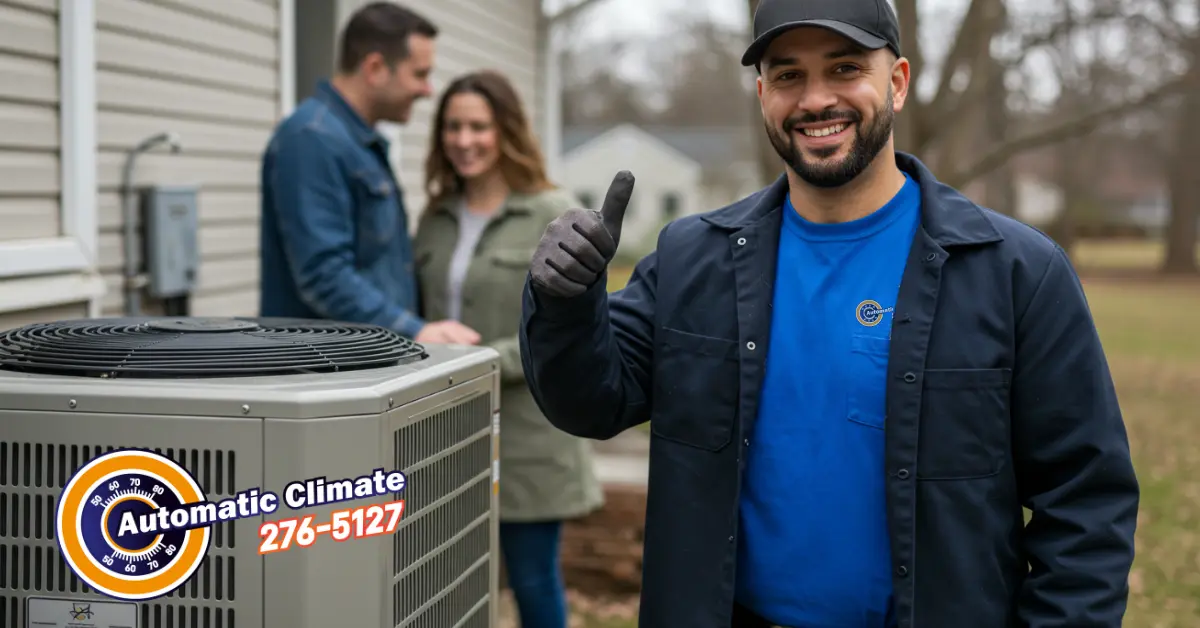
Chart: Essential HVAC Maintenance Tips to Prevent Noises
Sources: Maintenance recommendations based on industry best practices found on sites like This Old House and general HVAC service guidelines.
DIY Fix vs. Professional Help: Knowing When to Call Automatic Climate
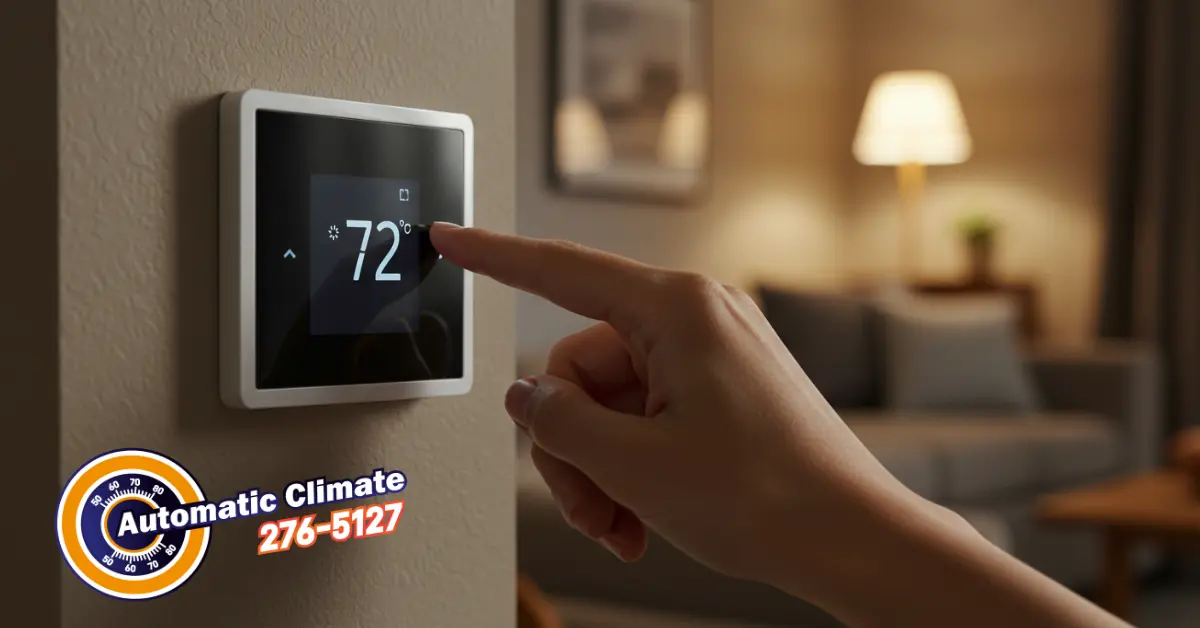
So, your HVAC system making strange or loud noises has caught your attention. You’ve listened closely, maybe even identified the type of sound based on our guide. Now what? While some minor issues like changing an air filter or tightening an external panel screw are safe DIY tasks, many HVAC noises signal problems that require expert diagnosis and repair.
Attempting complex repairs without proper training and tools can be dangerous (especially with electrical components or refrigerant) and could potentially void your system’s warranty or cause even more damage. Knowing when to pick up the phone and call a trusted professional like Automatic Climate is key.
Red Flags: Noises That Demand Professional Attention
If your HVAC system making strange or loud noises falls into these categories, don’t hesitate to call us at (804) 803-1983:
- Loud Banging or Clanking: Suggests serious internal mechanical issues (blower, compressor). Turn the system OFF.
- Grinding Sounds: Almost always indicates severe motor or compressor problems. Turn the system OFF.
- Screeching or Screaming: Could be failing motor bearings or dangerously high compressor pressure. Turn the system OFF immediately.
- Persistent Buzzing: Likely electrical issues (capacitor, contactor, wiring, motor). Poses a safety risk.
- Hissing (especially with poor cooling): Strongly suggests a refrigerant leak, which requires licensed handling.
- Constant Clicking (preventing operation): Points to control board, thermostat, or ignition problems requiring diagnosis.
- Any Noise Accompanied By:
- Burning smells
- Smoke
- Complete loss of heating or cooling
- Frequent circuit breaker tripping
- Visible damage to the unit
Essentially, any noise that sounds severe, indicates friction or electrical problems, or is coupled with performance issues should be evaluated by a professional. An HVAC system making strange or loud noises of this nature is not something to ignore or experiment with.
The Automatic Climate Advantage: Why Choose Us for Your Noisy HVAC?
When your comfort and safety are on the line, you need an HVAC partner you can trust. Here’s why Richmond residents have relied on Automatic Climate since 1983:
- Experience & Expertise: With over four decades serving the Richmond area, we’ve encountered and resolved nearly every type of HVAC noise imaginable. Our technicians are highly trained and certified. Read more about us and our commitment.
- Accurate Diagnosis: We don’t guess. We use advanced diagnostic tools and systematic troubleshooting to pinpoint the exact cause of why your HVAC system making strange or loud noises.
- Honest Recommendations: We provide clear explanations of the problem and offer transparent options for repair or replacement, always keeping your budget and needs in mind. We won’t upsell you on services you don’t need.
- Quality Repairs: We use high-quality parts and adhere to industry best practices to ensure repairs are done right the first time, restoring quiet and efficient operation.
- Comprehensive Services: From emergency repairs (after-hours service available) and routine maintenance (heating tune-ups, AC tune-ups) to new system installations (heat pump installation, AC installation), we cover all your HVAC service needs.
- Customer Satisfaction Guarantee: We stand behind our work. Your comfort and satisfaction are our top priorities. Check out our customer reviews!
As Benjamin Franklin wisely noted, “An ounce of prevention is worth a pound of cure.” Regular professional maintenance is the best way to prevent your HVAC system making strange or loud noises in the first place. Our maintenance plans are designed to catch small issues before they escalate into noisy, expensive problems.
Don’t let a noisy HVAC system disrupt your peace or lead to costly breakdowns. Trust the experienced professionals at Automatic Climate to diagnose the issue accurately and provide reliable solutions. An HVAC system making strange or loud noises is a call for help – let us answer it.
Hearing Strange HVAC Noises?
Don’t wait for a breakdown! Let Richmond’s trusted experts diagnose the problem.
Contact Automatic Climate today for fast, reliable service.
Or Call: (804) 803-1983
Case Study: The Persistent Rattle Resolved
Client:** A homeowner in Richmond, VA.
Problem:** The client reported their HVAC system making strange or loud noises – specifically, a persistent rattling sound coming from the outdoor AC unit, getting worse over several weeks.
Diagnosis:** An Automatic Climate technician performed a thorough inspection. While the exterior panels were secure, listening closely revealed the rattle intensified when the condenser fan was running. Upon careful examination (with power safely disconnected), the technician found that the fan motor’s mounting bolts had loosened slightly due to normal operational vibrations over several years. This allowed the motor to vibrate excessively within its housing, causing the rattling noise.
Solution:** The technician securely tightened the motor mounting bolts and inspected the fan blades for balance and damage (none found). The system was tested, and the rattling noise was completely eliminated.
Outcome:** The homeowner was relieved to have the annoying noise gone. Addressing this relatively minor issue prevented potential further damage to the motor or fan blades that could have resulted from continued excessive vibration. This highlights how even seemingly small noises can indicate underlying issues best addressed by a professional.
Source: Representative example based on common service calls handled by experienced HVAC technicians like those at Automatic Climate.
Proactive Steps: Simple Troubleshooting and Preventing Future Noises
While many instances of an HVAC system making strange or loud noises require professional help, there are a few simple checks and preventative measures homeowners can take. These steps can sometimes resolve minor issues or, more importantly, help prevent noises from developing in the first place.
Basic Homeowner Troubleshooting Checks
Before calling for service (unless it’s an emergency sound like grinding or screeching), consider these quick checks:
- Check the Air Filter: Is it dirty or clogged? A blocked filter is a common cause of whistling, reduced airflow, and system strain. Replace it if necessary. This is the single most important DIY maintenance task.
- Inspect Outdoor Unit for Debris: Look for leaves, twigs, grass clippings, or other obstructions around and inside the top of the condenser unit. Carefully remove any visible debris (ensure power is OFF at the breaker before reaching inside).
- Check Vents and Registers: Are they open and unobstructed? Ensure furniture, rugs, or curtains aren’t blocking airflow, which can cause whistling or strain the system.
- Listen Closely to the Location: Try to pinpoint where the noise is coming from – the outdoor unit, the indoor air handler/furnace, or the ductwork? This information is helpful when you call a technician. Is the HVAC system making strange or loud noises constantly, or only during startup/shutdown?
- Check Thermostat Settings: Ensure the thermostat is set correctly (Heat/Cool mode, desired temperature) and has fresh batteries if applicable. Sometimes incorrect settings can cause unexpected system behavior.
- Look for Loose Panels: Gently check if the access panels on the indoor and outdoor units are secure. Tighten any obviously loose screws if you feel comfortable doing so.
If these simple checks don’t resolve the noise, or if the noise is severe, it’s time to call Automatic Climate. Don’t attempt internal inspections or repairs beyond these basic steps unless you have specific HVAC training.
The Power of Prevention: Regular Maintenance is Key
The absolute best way to deal with an HVAC system making strange or loud noises is to prevent it from happening. Regular, professional maintenance is crucial for keeping your system running quietly, efficiently, and reliably for years to come.
Think of it like changing the oil in your car. You wouldn’t skip that, right? HVAC systems are complex mechanical devices that benefit immensely from annual tune-ups. Here’s what professional maintenance typically includes and how it prevents noise:
- Cleaning Coils (Indoor & Outdoor): Dirty coils restrict airflow and heat transfer, forcing the system to work harder and potentially causing noise or component strain.
- Lubricating Moving Parts: Motors (blower, condenser fan) have bearings that require lubrication. Lack of lubrication leads to friction, causing squealing and eventual grinding failure.
- Checking and Tightening Electrical Connections: Loose connections can cause buzzing and are a potential fire hazard. Technicians ensure all wiring is secure.
- Inspecting Capacitors and Contactors: These electrical components are common failure points that can cause buzzing or clicking. Technicians test them and can recommend replacement before they fail completely.
- Checking Refrigerant Levels (AC/Heat Pump): Incorrect refrigerant charge (low or high) impacts performance and can damage the compressor, potentially leading to various noises. (Requires licensed technician).
- Inspecting Fan Blades and Blower Wheel: Checking for damage, tightness, and balance prevents rattling, banging, or grinding noises.
- Checking Belts (If Applicable): Inspecting for wear and proper tension prevents squealing.
- Inspecting Ductwork (Visual): Looking for obvious leaks or damage that could cause whistling or rattling.
- Testing Safety Controls: Ensuring safety mechanisms are functioning correctly prevents dangerous operating conditions.
- Checking Thermostat Calibration: Ensures accurate temperature control and proper system cycling.
Investing in an HVAC maintenance agreement with Automatic Climate is investing in peace of mind. It not only helps prevent your HVAC system making strange or loud noises but also improves efficiency (lowering energy bills), extends the lifespan of your equipment, and ensures safer operation. We often identify potential issues during routine maintenance that could have turned into noisy emergencies later.
Don’t wait until your HVAC system making strange or loud noises forces you to pay attention. Be proactive! Change those filters regularly and schedule your annual professional tune-ups with Automatic Climate. Your ears (and your wallet) will thank you.
As Leonardo da Vinci supposedly said, “Details make perfection, and perfection is not a detail.” Paying attention to the small details of HVAC maintenance prevents the big, noisy problems.
Frequently Asked Questions About HVAC Noises
1. Is it normal for my HVAC system to make some noise?
Yes, some level of noise is normal. You should expect the gentle hum of the fan, the whoosh of air through vents, and occasional clicks from the thermostat or relays. It’s the new, loud, sudden, or persistent strange noises (banging, grinding, squealing, etc.) that indicate a potential problem with your HVAC system making strange or loud noises unexpectedly.
2. My AC makes a loud bang when it starts. What could it be?
This could be ductwork expanding (“oil canning”), a loose part in the blower assembly, or an issue with the compressor starting under pressure. Due to the potential for serious mechanical issues, it’s best to have this checked professionally. Source: Common diagnosis based on resources like Today’s Homeowner.
3. Why is my furnace making a rattling noise?
Rattling often comes from loose access panels, debris in the unit or ducts, loose internal components (like motor mounts or fan blades), or sometimes just the vibrations of an aging system. Check for loose panels first, but internal rattles need a pro.
4. What does a buzzing sound from my outdoor unit mean?
Buzzing usually points to an electrical issue. Common culprits include a failing capacitor, a faulty contactor relay, loose wiring, or problems with the condenser fan motor. Turn off the power and call a technician, as electrical issues can be hazardous.
5. My vents are whistling. How do I fix it?
Whistling often indicates restricted airflow. Check for a dirty air filter (replace if needed), ensure vents aren’t blocked by furniture, and check for leaks in accessible ductwork. If these don’t help, you may have leaks in inaccessible ducts requiring professional sealing.
6. I hear a squealing sound. Is that serious?
Yes, squealing usually indicates friction from failing motor bearings or a worn/slipping belt (in older systems). Ignoring it can lead to motor failure. It needs professional attention soon.
7. What should I do if my HVAC system makes a grinding noise?
Turn the system OFF immediately! Grinding indicates a severe mechanical failure, likely within a motor or the compressor. Continued operation will cause more damage. Call for emergency service.
8. Is a hissing sound from my AC dangerous?
It can be. Hissing often signals a refrigerant leak. Refrigerant is under pressure and requires licensed handling. A leak impacts cooling and can damage the system. In rare cases, a very loud hiss or scream indicates dangerously high pressure – shut the system off immediately if you hear that.
9. Can a dirty air filter really cause noises?
Absolutely. A clogged filter restricts airflow, forcing the blower motor to work harder (potentially causing humming or buzzing) and can cause air to whistle as it’s forced through small gaps. It’s a common cause for an HVAC system making strange or loud noises related to airflow.
10. Why does my heat pump make noise in the winter?
Heat pumps can make whooshing or brief rattling sounds during the defrost cycle, which is normal. However, persistent loud noises like grinding or squealing indicate a problem, just like in cooling mode. Some operational noise is expected, as noted by sources like The Spruce.
11. My HVAC system is old. Is noise just part of aging?
Older systems might vibrate more or have slightly louder normal operation, but significant new noises (bangs, grinds, squeals) are still indicators of specific problems, not just “old age.” They signal parts wearing out that likely need repair or replacement.
12. Can closing vents in unused rooms cause noise?
Yes. Closing too many vents significantly increases air pressure in the ducts, which can lead to whistling noises at the remaining open vents and put extra strain on your blower motor. It’s generally recommended to keep most vents open.
13. What’s the difference between a hum and a buzz?
A low, steady hum might be normal motor operation. A louder, harsher buzz often indicates an electrical issue (like a failing capacitor or loose wiring) or a motor struggling under load. If a normal hum turns into a louder buzz, get it checked.
14. My AC gurgles sometimes. Is that bad?
Gurgling can be caused by a partially clogged condensate drain line (water backing up) or potentially by refrigerant issues (low levels or air in the lines). Check the drain line first, but if it persists or cooling is affected, call a pro.
15. How often should I have my HVAC system professionally maintained to prevent noise?
Annual maintenance is recommended – typically in the spring for your AC and the fall for your heating system. Regular tune-ups are the best way to catch potential noise-causing issues early. Consider our maintenance agreements for convenience.
16. Can running the HVAC with a strange noise cause more damage?
Yes, absolutely. Noises like banging, grinding, or squealing indicate parts are loose, broken, or lack lubrication. Continuing to run the system can cause these failing parts to damage other components, turning a smaller repair into a major one.
17. Will duct cleaning help with HVAC noises?
It might help if the noise is rattling caused by debris *inside* the ducts. However, most serious HVAC noises (banging, grinding, buzzing, squealing) originate from the mechanical components (motors, fans, compressor) or electrical parts, not the ducts themselves. Consider air duct cleaning primarily for air quality improvement.
18. My thermostat clicks a lot. Is that the problem?
Some clicking from the thermostat relay is normal when it signals the HVAC system. However, if it clicks repeatedly without the system starting, or clicks constantly, the thermostat itself might be faulty or there could be a wiring issue preventing the signal from reaching the HVAC unit.
19. Can I use a sound blanket on my noisy outdoor unit?
Yes, compressor sound blankets are designed to wrap around the compressor (inside the outdoor unit) to dampen noise, primarily the humming/buzzing of normal operation. They can be effective but won’t fix underlying mechanical problems causing abnormal noises like banging or grinding. Installation requires opening the unit, so professional help is often recommended. Source: Mentioned as a solution by Family Handyman.
20. If my HVAC system making strange or loud noises stops, is the problem gone?
Not necessarily. Intermittent noises can still indicate an underlying issue (like a component overheating and temporarily shutting down, or a loose part shifting). If a concerning noise occurred, it’s best to get it checked out even if it stops, as the root cause likely still exists and could return or worsen.
FAQ answers based on general HVAC knowledge and information synthesized from resources covering HVAC troubleshooting.
Don’t Let HVAC Noises Disrupt Your Comfort
An HVAC system making strange or loud noises is more than just an annoyance; it’s a signal that your home’s essential comfort system needs attention. By understanding the potential causes behind bangs, rattles, buzzes, and squeals, you can take appropriate action – whether it’s a simple DIY check or calling in the experts.
Remember, prompt attention to unusual sounds and regular preventative maintenance are the keys to a quiet, efficient, and long-lasting HVAC system. For reliable diagnosis and repair of any HVAC system making strange or loud noises in the Richmond, VA area, trust the experience and dedication of Automatic Climate. We’ve been keeping Richmond comfortable since 1983.
Contact Automatic Climate Today!
Call Us: (804) 803-1983
Further Reading & External Resources:
- What Can You Do About a Noisy Air Conditioner? – Family Handyman
- 10 Handy Air Conditioning Tips to Keep Your Home Cool – This Old House
- Heat Pump Not Cooling? This Is Why—and What to Do About It – Bob Vila
- Heat Pump vs. Furnace: Differences, Pros, and Cons – The Spruce
- Why Is My AC Making a Loud Noise When Starting or Shutting Off? – Today’s Homeowner
- 20 Annoying Home Noises, and How to Eliminate Them Forever – Family Handyman
Hashtags:
#HVACnoise #HVACrepair #AirConditionerNoise #FurnaceNoise #HeatingAndCooling #HVACmaintenance #HomeMaintenance #RichmondVA #RVA #AutomaticClimate #HVACexperts #StrangeNoises #LoudHVAC #ACrepair #HeatingRepair #HVACsounds
Legal Disclaimer:
This article was drafted with the assistance of a Large Language Model, specifically Gemini, which was used for initial drafting and article outlining. The content was subsequently reviewed, edited, and fact-checked by a human writer to ensure accuracy, clarity, and adherence to editorial standards. While AI assisted in the creation of this content, the human author(s) retain editorial control and full responsibility for the final content, including its accuracy and integrity. Readers should be aware that AI-generated content may present limitations, and the information provided should be considered with this in mind.
The information provided in this article is for general informational purposes only. While we strive to keep the information up-to-date and correct, we make no representations or warranties of any kind, express or implied, about the completeness, accuracy, reliability, suitability, or availability with respect to the 1 article or the information, products, services, or related graphics contained in the article for any purpose. Any reliance you place on such information is therefore strictly at your own risk. 2 HVAC systems involve electrical components, refrigerant, and potentially natural gas; attempting repairs without proper training and safety precautions can result in injury, property damage, or voiding warranties. Always consult with a qualified and licensed HVAC professional, like those at Automatic Climate (https://www.automaticclimate.com/, (804) 803-1983), for diagnosis and repair of HVAC issues, especially when dealing with an HVAC system making strange or loud noises
Our Trusted Partners
EXCELLENTTrustindex verifies that the original source of the review is Google. Aaron J. Visited our home later this evening to follow up with today’s install and the system checked out as it should. The only issue we had was connecting and setting up the wireless thermostat due to the app issues. He was very professional and patient. John and Joe replaced our 2nd floor gas heating system in a professional manner. Everything went smooth according to them and they finished the job in less time than expected. Aaron was professional and extremely thorough during his visit to our home. He took the time to explain the workings of our HVAC system and answered every question. To add to the above, I called the office and spoke with both Austin and Jason who were also very helpful while explaining the warranty and transfer of same. We are extremely pleased with Automatic Climate and will highly recommend to anyone who may ask for recommendations.
Owner's reply
Thank you for sharing your positive experience! We're thrilled Aaron, Austin, and Jason could assist you so thoroughly. Your recommendation means a lot, and we're glad we could help with your HVAC system and warranty details.Posted onTrustindex verifies that the original source of the review is Google. I had a very positive experience with them. They had better financing options, better prices, and were more responsive than other companies I got quotes from. Michael Chris and the whole team were fantastic. Highly recommendPosted onTrustindex verifies that the original source of the review is Google. Technician was on time, personable and professional. He throughly explained everything that he was going to do and identified any concerns. Very pleased with the overall experience and would recommend to other homeownersPosted onTrustindex verifies that the original source of the review is Google. I had the coils cleaned in my tankless water heater. Aaron Jernigan was so seemingly competent, so well-mannered, so good explaining what was going on, I am considering switching to Automatic Climate, I will definitely have all the vents in my house blown out in the near future.Posted onTrustindex verifies that the original source of the review is Google. Fast, friendly, knowledgeable and professional. Their associate, Casey J, helped fix our heat when we were enduring 20-30 degree nights. Thank you so much!!Posted onTrustindex verifies that the original source of the review is Google. Charlie was very dedicated. Provided excellent service. Very impressed with his dedication. Did check on HVAC and cleaned drier vent in Condo we purchased last summer.Posted onTrustindex verifies that the original source of the review is Google. I've been a customer of Automatic Climate for several years. I value the services of this firm. My commitment to renewing my maintenance contract year after year is directly related to the technical expertise of one of the company’s many representatives, Antonio Diaz. Antonio has kept all three of my units running smoothly for years, and when necessary forewarns me early of any pending issues. He offers solutions right away without long waits for follow up. I've never had to call the company back to correct any of his work. Antonio attributes his success and extraordinary customer service to the culture of Automatic Climate. I would recommend Antonio and Automatic Climate to any of my friends and neighbors. They're a company you can trust.
Owner's reply
Thank you so much for your kind words! We're thrilled to hear you had a positive experience with our service.Posted onTrustindex verifies that the original source of the review is Google. John & Nick were here today to clean our air ducts. They were very thorough and made sure that they left our home as clean as when they arrived. They explained the process clearly and worked efficiently. Great job!Verified by TrustindexTrustindex verified badge is the Universal Symbol of Trust. Only the greatest companies can get the verified badge who has a review score above 4.5, based on customer reviews over the past 12 months. Read more
